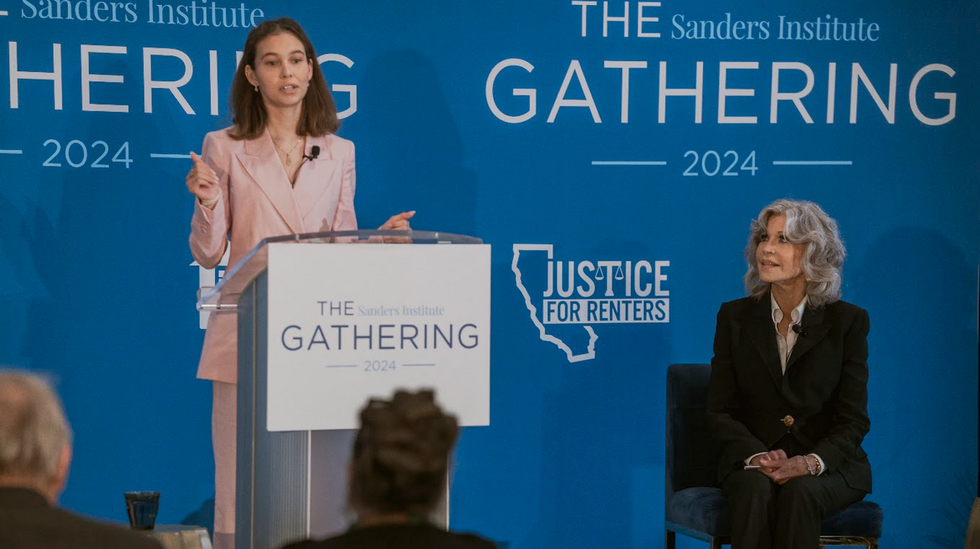California Victory Against Big Oil Shows What's Possible When We Fight
Together, we are forging a path toward a world where every voice is heard, every life is valued, and every community thrives free from the threat of environmental harm.
Our win against fossil fuel giants in California last month—a modern-day David and Goliath fight—marks a profound victory in our ongoing battle for a cleaner, healthier world.
In the face of overwhelming opposition, California oil and gas drillers withdrew a challenge at the ballot box to a landmark state law that banned new oil drilling within 3,200 feet of a community and requires tighter health and safety standards for existing wells. The ban is now in effect. This triumph resonates far beyond the immediate victory; it reaffirms the enduring power of community and the relentless pursuit of justice. In California, we have shattered the illusion that profit should outweigh the health and safety of our people. Our collective voice has risen above that of the oil industry, proclaiming that our lives are not negotiable commodities.
Nearly 30,000 oil and gas wells in California sit within 3,200 feet of sensitive land, exposing the health and safety of nearly 3 million innocent Californians. These wells are disproportionately placed in communities of color, and their emissions can cause birth defects, respiratory illnesses, and even cancer. In 2021, an independent scientific advisory panel advised California officials that a 3,200-foot setback between oil wells and sensitive receptors is the minimum distance to protect public health.
In California, we have shattered the illusion that profit should outweigh the health and safety of our people. Our collective voice has risen above that of the oil industry, proclaiming that our lives are not negotiable commodities.
In the face of these stark realities, California Senate Bill (SB)1137 emerged as a beacon of hope—a legislative effort to establish a health and safety buffer zone between oil operations and communities. This bill aimed to safeguard public health and the environment by imposing sensible setbacks, ensuring that our neighborhoods are no longer sacrificed for corporate gain. However, the road to implementing this crucial legislation was blocked when the drillers put a referendum on the ballot to overturn the law and undo the will of the people.

The oil industry, driven by profits and indifferent to the suffering of kids and communities, launched a relentless campaign against SB 1137. Pouring a staggering $61 million into efforts to overturn the law, they sought to drown out our voices with misleading campaigns and political maneuvers. Their deep pockets funded a barrage of advertisements, lobbyists, and deceptive rhetoric aimed at undermining the very protections that our communities won and desperately need.
But we refused to be silenced. Armed with determination and unwavering resolve, we mobilized grassroots movements, rallied community support, and engaged lawmakers to stand firm against industry pressure. Our collective advocacy turned the tide, demonstrating that people power can triumph over corporate interests. Despite the formidable opposition, SB 1137 stood strong, embodying our unwavering commitment to justice and public health.
My childhood was stolen by the impacts of the fossil industry, and they cast a shadow over my future. I fight every day to ensure that my story will end with me.
My personal journey into activism was fueled by firsthand experience—the profound impact of living 30 feet away from an active oil and gas well that poisoned my health and threatened my future. This intimate connection to the issue ignited a fire within me, propelling me into advocacy at a young age. The diagnosis of stage 2 reproductive cancer at 19 was a devastating consequence of this environmental injustice—a reminder of the stakes in our fight. My childhood was stolen by the impacts of the fossil industry, and they cast a shadow over my future. I fight every day to ensure that my story will end with me.
Last month's victory, and Big Oil’s unconditional surrender, is not just about legislative success; it is a testament to the resilience of communities and the power of grassroots activism. It symbolizes hope for a future where our children can grow up without fear of toxic exposure and where justice prevails over corporate greed. Together, we have proven that when we unite in pursuit of a common cause, we can achieve transformative change.
As we celebrate this milestone, let us remember that our work is far from over. Big Oil has already announced plans to sue over the law, hoping to overturn our victory in the courts. We must stand together and continue defending the 3,200-foot setback law to ensure that all Californians are protected from toxic oil drilling in their neighborhoods.
Let this victory propel us forward, energized and emboldened, to continue pushing for environmental justice and equity. Let us hold steadfast in our commitment to protect our communities, our health, and our planet from the harms of industrial pollution. Let’s continue to bring the fight to Big Oil and keep them on the run.
Together, we are forging a path toward a world where every voice is heard, every life is valued, and every community thrives free from the threat of environmental harm. This victory is not the end of our journey but a pivotal step forward in the ongoing fight for a better, healthier future for all.


